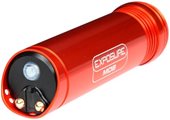The fall of a man into the sea is a more frequent occurrence than you can imagine and can have dramatic consequences. Therefore, technology has moved in the direction of finding solutions that limit the risks associated with recovery operations. Below are some of the devices that use MOB functions.
MOB function on a Nautical GPS
The Nautical GPS often offers the MOB function also with a dedicated key so that the captain can press it immediately in case of a crew member falling into the sea, at which time the target position will be the position of the moment when you pressed the key that is supposed to be not very different from that of the position of man at sea.
Many people do not recommend the use of this function and simply to memorize the position, because often following the approach with the nautical GPS, can distract from the main objective that is to intercept on sight the man at sea to prevent it from ending up under the boat or its propellers.
MOB Lighthouses
Recently, portable MOB lights have appeared on the market, which activate the light or strobe automatically on contact with water. This makes it particularly easy to detect humans in difficult night conditions. The Exposure Lights brand was the first to design a carefully designed portable headlamp for these needs.
Common MOB devices
They are equipped with a sensor that the crew must wear. When the casualty falls into the sea, the sensor shall warn the Central Unit that an alarm is starting to sound, so that the master and the crew are promptly notified.
Some models are equipped with a sensor with locator, so that the position of man at sea can be continuously monitored.
New models have recently been introduced, such as the OLAS from Exposure Lights, which replaces the central unit with the smartphone, thus ensuring more affordable costs and the use of technologies that smartphones are already equipped with.
MOB devices with motor shutdown
They allow the engine to be switched off if the captain falls into the sea. This ensures greater safety in the event that the crew is resting or not present and therefore it may be noticed too late that the captain has fallen into the water.
In the event that a crew member falls into the water, these devices warn only sharply of the occurrence, to avoid unnecessary abrupt stoppage of the engine.
